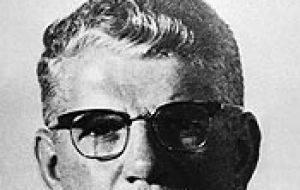MercoPress. South Atlantic News Agency
Nixon attempts to prevent Mitrione’s 1970 murder by Uruguayan urban guerrillas
 Daniel Mitrione, a director for the US Agency for International Development in Uruguay
Daniel Mitrione, a director for the US Agency for International Development in Uruguay President Richard Nixon’s administration suggested that Uruguayan leaders try to prevent the impending murder of a kidnapped US official by threatening to kill members of the insurgent group responsible for the abduction, according to newly declassified cables reproduced by Bloomberg News.
Daniel Mitrione, a director for the US Agency for International Development in Uruguay, was found dead August 10, 1970 after being kidnapped by Tupamaros guerrillas. The group, whose members included current Uruguayan President José Mujica, accused Mitrione of training police in torture and had been demanding the release of imprisoned rebels.
Then-Secretary of State William Rogers, facing a guerrilla deadline to kill Mitrione, wrote in a cable to the US Ambassador in Montevideo that “we have assumed that the Government of Uruguay has considered use of threat to kill” jailed rebel leader raúl Sendic and other key Tupamaros members, according to a declassified State Department cable that was posted on the National Security Archive website Wednesday.
“If this has not been considered, you should it raise it with” the Uruguayan government “at once,” according to the two-sentence cable dated Aug. 9, 1970.
In response, Ambassador Charles Adair said that he showed Rogers’ cable to the Uruguayan Foreign Minister Jorge Peirano, who told him that his government didn’t permit such action.
Still, prisoners were informed through “indirect means” that private death squads would take action against their relatives if the guerrillas carried out their ultimatum and killed Mitrione, Adair wrote in a separate cable, one of nine documents posted Wednesday on the Washington-based research institute’s website.
Nixon, in a separate cable dated Aug. 6, urged Uruguayan President Jorge Pacheco Areco to use “every means available” to secure Mitrione’s release. Three days later, he insisted to Pacheco Areco that Uruguay “spare no effort” to free Mitrione and Claude Fly, a second U.S. official kidnapped.
State Department spokesman Charles Luoma-Overstreet had no immediate comment when contacted by Bloomberg News. A message left with Anthony Curtis, a spokesman for the Richard Nixon Library and Museum in Yorba Linda, California, wasn’t immediately returned. Nixon died in 1994, Rogers in 2001, and Adair in 2006.
Mitrione was found dead in an abandoned car twice shot in the head and with clear evidence of having been tortured while in captivity. He was a former FBI agent and so was his son expelled from the bureau in 1985.
Mitrione’s activities and murder inspired director Constantin Costa-Gravas’ 1973 movie “State of Siege.”
The Tupamaros, inspired by Fidel Castro’s 1959 revolution in Cuba, kidnapped the Americans and wealthy Uruguayans in a bid to destabilize Pacheco Areco’s government as it declared a state of emergency to stamp out inflation and political dissent. The military, which was charged with combating the insurgents, eventually seized power in 1973 and held onto it until 1985.
Carlos Osorio, director of the National Security Archive’s Southern Cone documentation project, said in an interview that the cables, which were found after two years of research, are the earliest recorded recognition by the U.S. government of the existence and use of Uruguayan death squads.
The National Security Archive is a research institute housed at The George Washington University that collects and publishes declassified documents obtained through the Freedom of Information Act.
Mujica, 75, was imprisoned for more than a decade by the military governments that ruled Uruguay in the 1970s and 1980s.
The former revolutionary was elected president in November on a pledge to continue the economic policies of his predecessor that attracted record foreign investment, boosted trade with the U.S. and quadrupled central bank reserves to 7.9 billion US dollars.
During the campaign Mujica took distance from Venezuelan President Hugo Chavez, a close ally of Fidel Castro and the most vocal critic of the U.S. in Latin America




Top Comments
Disclaimer & comment rulesCommenting for this story is now closed.
If you have a Facebook account, become a fan and comment on our Facebook Page!